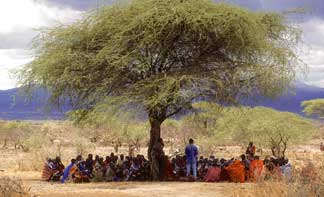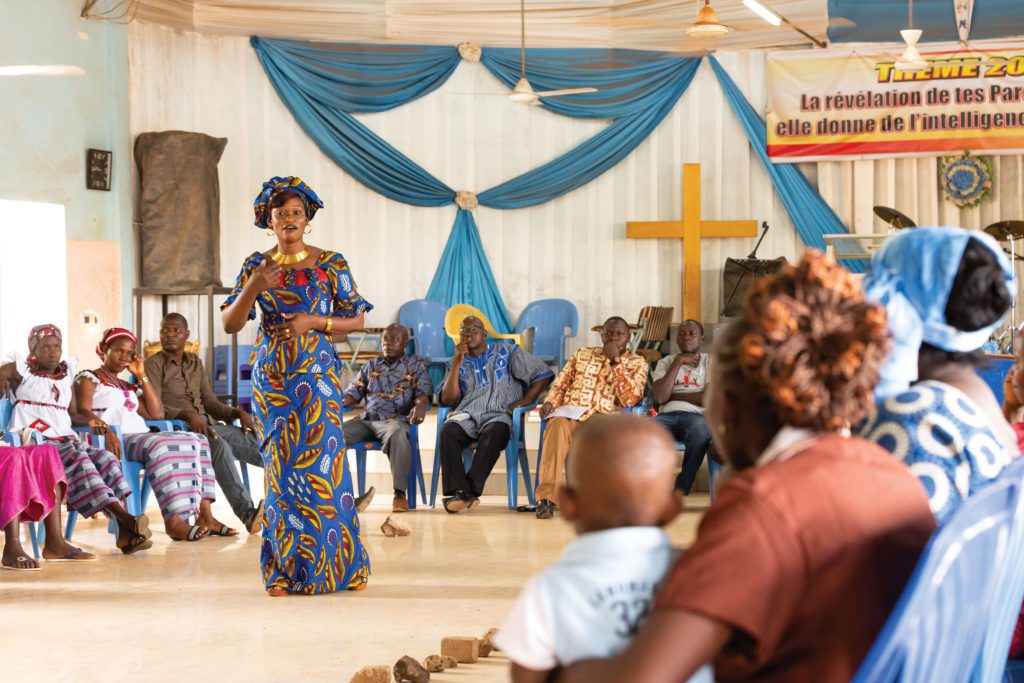The Efficiency of Storying

by Cameron D. Armstrong
A defense of how Chronological Bible Storying produces true and faithful disciples who may or may not hunger for literate depth.

Much has been written on the subject of orality over the previous century, yet it has only been in the previous half century that the subject has intersected with the Christian missionary enterprise. Christian leaders who are proponents of the trend have thrown their support behind the innovative tool known as Chronological Bible Storying (CBS), seeing the method as a non-threatening and effective way to relay the gospel message to oral peoples in a culturally appropriate, narrative form.
CBS utilizes worldview analysis, scripture fidelity, and discussions of proper contextualization to formulate biblical story sets that will deeply resonate within the hearts of the oral (“non-literate”) host community. Yet the movement is not without skeptics, who see CBS as a short-term solution to the long-range problem of biblical ignorance.
In this article, I will argue that CBS may not be “sufficient” to satisfy every attack waged against the methodology by its highly literate skeptics, but storying is “efficient” in the sense that CBS is producing obedient Christians who gather as true, reproducible churches to intimately apprehend God.
I will begin by tracing the history of some of the missionary efforts among oral cultures, including practices and theoretical lessons gleaned from such experiences, and then discuss the development of CBS. I will discuss some of the questions raised against CBS and show that Bible storying need not thoroughly satisfy every raised objection in order to be deemed a highly successful missionary tool among oral peoples.
Orality and Missions
“Orality” as an academic discipline first began in the realm of ancient literary studies. In the early 1900s Milman Parry and Albert Lord explored the historic question of who the poet Homer actually was and whether or not he was a literate composer of his Iliad and Odyssey. Parry and Lord concluded that Homer was an illiterate master poet, who powerfully consolidated the legends of his people using as their comparative source the passing on of tradition by the illiterate Southern Slavs of former Yugoslavia.
Known as the “oral-formulaic theory,” Parry and Lord noted that Southern Slav epic poets did not pass on their cultural traditions in a verbatim manner, but they did craft the traditions contextually in such a way that their listeners understood them to be virtually identical.
A follower of the oral-formulaic proposal, Jesuit missionary Walter Ong notes that citizens of an oral society think about their world quite differently than those from a literate, print-based culture (1982, 1). For example, whereas literate men and women tend to view words as information to be passed on, oral communicators see words as objects to be launched into actions. Words are not frozen in time for oral peoples, but their traditions are constantly being passed on through performative, memorable means. The stories told again and again in oral cultures are rooted in personal feeling that is largely foreign to literate cultures that are ever hunting for objectivity and detachment (1982, 8).
In 1957, Hans Rudi Weber published a book about his missionary experiences among an oral people group in Indonesia. Although he considered illiteracy to be the defining characteristic of the people among whom he ministered, Weber was the first to pose the question of what literate cross-cultural workers can learn from oral-based communicators.
Weber realized that the indigenous groups had difficulty defining objects, concepts, or events, and would instead answer his questions with stories that embedded their answers within them. Clarity in communication, Weber found, was not specifically translatable across cultures in exactly the same manner. The oral communicators displayed powerful imaginations and observations about the world around them, and group interaction in discovering greater implications of a tradition’s meaning played an integral role. Weber concluded his findings both by challenging foreign missionaries among oral cultures to proclaim the Christian message dramatically and picturesquely, not merely intellectually, and by cautioning missionaries not to treat oral peoples as unlearned children.
Twenty years after the publication of Weber’s work, Trevor McIlwain of New Tribes Mission began pioneering a method that would become known as Chronological Bible Teaching (CBT). Noticing the lack of obedience among the “Christianized” oral natives of Palawan (Philippines), McIlwain began expositionally teaching chronologically through several biblical stories, and God granted him wonderful success.
Southern Baptist missionaries in the Philippines first adapted CBT because they viewed the lecture-style teaching as still too-literate an approach. Their adaptation, called Chronological Bible Storytelling, relates biblical stories while weaving in explanatory comments throughout the narrative. A decade or so after this time, Southern Baptist missionaries Jim Slack and J.O. Terry began a third approach that relayed only the story itself, and this they termed Chronological Bible Storying (CBS). In CBS, the hope is that listeners will not become confused about what parts of the narrative are biblical and what are not. CBS is still the model used most widely among oral people groups by Southern Baptist missionaries and their partners today.
Objections
Perhaps the most notable evangelical voice who has raised concerns about orality and missions is pastor-scholar John Piper, who has proved himself a fierce advocate of missions, developing his thoughts in book form in his Let the Nations Be Glad! (2010). Piper’s famous quote that “missions exists because worship doesn’t” has fueled missionaries bent on filling the earth with worshippers (2010, 15). Even in my own life, Piper’s book was largely responsible for awakening this desire.
Yet in the area of oral-based missionary efforts, Piper has raised some doubts about trainers’ motives and long-term goals. In a blog post dated November 16, 2005, Piper introduces his readers to the subject of orality and missions, claiming that he is unsure about the biblical convictions of practitioners of oral-based mission strategies such as CBS. Piper then asks nine questions regarding the labors Christian missionaries among “pre-literate” and “post-literate” (westerners who can read but choose not to) cultures will perform, ultimately displaying that oral cultures will need full competency in the original biblical languages if they are to become truly healthy.
Response
Let me respond with two particular objections. First, in calling oral peoples “pre-literate”, Piper has already betrayed his position on the topic: cultures that live by oral means are deficiently waiting for literates to teach them how to read. While Piper cannot be blatantly accused of Western condescension, such language presumes an almost colonial-type missiology reminiscent of previous centuries of mission history. Many Western mission strategists of earlier times unfortunately viewed their mission as positioning indigenous churches to become like the missionaries’ cultures in dress, preaching style, and polity. Given that Piper has argued against such models in previous writings, he cannot be faulted for pushing such “under-contextualized” missionary methods (cf. Hiebert 1987, 104-112).1
Nonetheless, evaluating ethno-linguistic groups as either literate or “waiting-to-become-literate” confuses the missionary goal as calling for both linguistic education and evangelism from the outset. If time prohibits oral peoples from learning to read and attending years of seminary classes, one wonders why any indigenous Christian would aspire to become a pastor.
Second, Piper’s claim that competency in Greek and Hebrew is necessary for sustaining healthy and lasting churches is unwarranted at best. Twice Piper states that incompetency in the original biblical languages will cause “dependency on outsiders” for communicating God’s truth. Again, one must ask whether or not obtaining a seminary degree in biblical language proficiency is necessary to access the full counsel of God.
If missionaries always declare, as Piper challenges them to, “that this Bible was first written in Greek and Hebrew, the languages that God used centuries ago,” it is highly possible that oral communities will become discouraged because it seems God speaks only to the educated. Long-range goals of higher education (much less church-planting movements) will be useless if lay people believe God truly communes only with highly literate professionals.2
Oral groups must be seen as inherently capable of producing obedient, reproducing Christians that gather into obedient, reproducing churches. In this final portion, a middle ground is offered that does not precisely equate storying with the comprehensive revelation of scripture itself, but still sees Bible storying (CBS) as efficient for salvation and church multiplication among oral peoples. Only then can the questions Piper has raised be balanced with issues of missionary contextualization.
Contextualization and Efficiency
All Christians intent on sharing the gospel message wrestle with the issue of contextualization. The question is simply how far they should go into the language and customs of the host culture in order to rightly proclaim their faith in a way that will produce mature and ministering worshippers of God. The objections raised against CBS by men such as Piper display a distinct suspicion of this type of contextualization. It is therefore important to address a few specific examples of how CBS is one way to properly contextualize the missionary’s message in a way that depicts both fidelity to scripture and sensitivity to culture.
Yet this method is capable of fulfilling the Great Commission. Three significant issues need to be addressed.
First, the goal in all missionary endeavors is obedience, both in taking the initial step to follow Christ and not settling for some form of half-hearted Christianity. Jesus’ “Great Commission” was to make disciples who obey all his commands (Matt. 28:19-20). Likewise, the Apostle Paul saw his missionary mandate as bringing about the “obedience of faith for the sake of [Jesus’] name among all nations” (Rom. 1:5).
Because faith will be proclaimed to real people in real cultures, missionaries must become fluent in not only the language of their host culture, but also how the indigenous men and women communicate in forms that elicit both verbal and active responses among their neighbors.
In this way, going deep in contextualization in order to produce obedient disciples is the best way to avoid syncretism. CBS takes into account the reality that oral peoples by definition learn in intrinsically different ways than literates, and so CBS asks the difficult worldview questions on the front end in order to craft stories, dramas, and songs in the local language of the people group that “target” individuals’ innermost passions (cf. Maxey 2009).
At the heart of everyone’s worldview is a story they tell about why the world works the way it does. When that story becomes the biblical story, there has been a sincere worldview shift. The greatest success stories from the mission field, where thousands have turned to Christ and are consistent in their faith, come when Western Christian workers lay down their own worldview presuppositions and refashion their methodology to fit the needs of their host culture.
Second, CBS story sets are designed in such a way that oral-based Christians may begin to construct a formidable “biblical theology.” In Making Disciples of Oral Learners (2005), a story is told where seventeen young evangelists from North Africa were trained for two years to tell 135 biblical stories chronologically, moving from Genesis through Revelation. Each story also included one or more songs that the evangelists could teach others. A North American seminary professor then gave the student an oral exam that lasted six hours, asking questions about both facts and systematic theology. Referring to the stories they had learned, the students passed with flying colors (2005, 46-47).
By drawing conclusions together about God from the multiple narratives, the students had constructed an accurate theology based entirely upon the stories they had learned to tell and sing. Insofar as the stories are as closely told to the biblical text as possible, while maintaining culturally appropriate forms and being closely “back translated” to check for transmission accuracy,3 the stories need not be supplemented by carefully exegesis in the original biblical languages to produce solid theology.
Third, CBS is designed for reproducibility. Since it is becoming widely recognized that oral cultures love to tell one another stories, CBS begins with the missionary crafting a biblical story set that addresses key longings, hopes, and desires integral to the host community. Stories are crafted and songs are comprised with the knowledge that the simplest messages are the most rapidly communicated.
While it may take one or more generations to produce a Bible translation in that local language, CBS works alongside, and not against, Bible translation efforts to begin reproducing indigenous evangelists. Maxey is again helpful here by demonstrating that contextualized translation work creates a useful dialogue between the culture of the Bible, the missionary, and the oral culture that will successfully deepen the translator’s labors (Maxey 2009, 32). I personally believe that such a dialogical mentality must be applied to CBS for achieving effective and lasting church-planting movements.
Although CBS as a methodology does not adequately address every question raised against it by skeptics, one must conclude that there is enough evidence to deem the method faithful in making obedient, reproducing disciples who gather into healthy churches.
Walter Kaiser writes, “Scripture, in any faithful translation, is sufficiently perspicuous (clear) to show us our sinfulness, the basic facts of the gospel, what we must do if we are to be part of the family of God, and how to live for Christ” (1980, 128). As far as the biblical stories shared are “faithfully translated” in a contextualized manner that holds biblical fidelity as its highest standard, the same can be said for churches planted by means of CBS. Contra the skeptics, orality strategies like CBS efficiently produce true and faithful disciples who may or may not hunger for literate depth.
Endnotes
1. Hiebert offers valuable insights concerning missionaries adapting their methodology in culturally appropriate ways while still maintaining a primary fidelity to God’s word. As such, it is an important source to consider in CBS, which is itself a contextualized model.
2. In December 2009, Piper was asked, “How would you study the Bible with people who can’t read?” Piper’s stated concern is that orality will be considered a “substitute” for literacy. His final statement concerning the orality movement is telling: “It may take a generation or two to get the book translated and to produce literacy, but what an arrogant thing it would be—wouldn’t it?—to say that orality is just as good as literacy. We’ll give them the stories they need, and now they can, for the next 100 or 300 years, or until Jesus comes, do everything in their way, not your Western literacy way. I think that is incredibly paternalistic” (see Piper 2009).
3. The process commonly called “back translation” refers to indigenous, oral Christians (or non-Christians) retelling the biblical story in their heart language to a bilingual communicator(s). The bilingual communicator then transcribes word for word the story in the local language (and often also into English), and afterward the Western missionary checks for biblical accuracy by marking corresponding verses next to each sentence. In this way, the story can be checked and re-checked for corruption in transmission.
References
Hiebert, Paul G. 1987. “Critical Contextualization.” International Bulletin of Missionary Research 11(3): 104-112.
International Orality Network and Lausanne Committee for World Evangelization. 2005. Making Disciples of Oral Learners. Lima, N.Y.: Elim Publishing.
Kaiser, Jr., Walter C. 1980. “Legitimate Hermeneutics.” In Inerrancy. Ed. Norman L. Geisler, 117-150. Grand Rapids, Mich.: Zondervan.
Maxey, James A. 2009. From Orality to Orality: A New Paradigm for Contextual Translation of the Bible. Eugene, Ore.: Cascade Books.
Ong, Walter J. 1982. Orality and Literacy: The Technologizing of the Word. London: Routledge.
Piper, John. 2010. Let the Nations Be Glad! 3rd ed. Grand Rapids, Mich.: Baker Books.
_____. 2009. “How Would You Study the Bible with People Who Cannot Read?” Accessed January 31, 2012, from www.desiringgod.org/resource-library/ask- pastor-john/how-would-you-study-the-biblewith-people-who-cant-read.
_____. 2005. “Missions, Orality, and the Bible.” Accessed January 31, 2012, from www.desiringgod.org/resource-library/taste-see-articles/missions-orality-and-the-bible.
Weber, Hans Rudi. 1957. The Communication of the Gospel to Illiterates. U.K.: SCM.
….
Cameron D. Armstrong is a church planter with the International Missional Board. He and his wife, Jessica, serve in Bucharest, Romania.
EMQ, Vol. 49, No. 2, pp. 322-326. Copyright © 2013 Billy Graham Center. All rights reserved. Not to be reproduced or copied in any form without written permission from EMIS.


